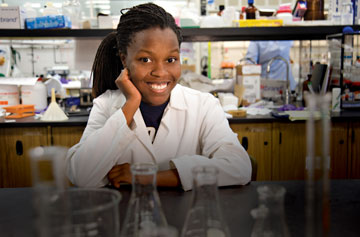Volume 28 · Number 1 · Fall 2010
Giving
Philanthropy Opens Doors for Student Researchers
Recent Philanthropic Support For UC Davis
During the 2009–10 fiscal year, UC Davis received
$112.3 million in private support, according to unaudited totals. This marks the fourth consecutive year that private support for UC Davis has surpassed $100 million. Read about some of those gifts...
Howard Hughes Medical Institute grants support undergraduate student research.
When Florentine Rutaganira started her junior year at UC Davis, she was already an accomplished, motivated student.
But a research experience she enjoyed that year in Assistant Professor Jared Shaw’s chemistry lab through the honors section of the Biology Undergraduate Scholars Program enabled her to develop new skills, hone her academic interests, and build a résumé that was appealing to many selective graduate programs. Philanthropy has been a vital part of Rutaganira’s success.

“HHMI’s support of this program really strengthened my academic experience,” says Florentine Rutaganira ’10
(Karin Higgins/UC Davis)
“Understanding how to be a scientist was key,” said Rutaganira, ’10, who graduated in June and began a Ph.D. program in chemistry and chemical biology at UCSF this fall. “I was a good student and I knew how to study, but it was BUSP Honors that really taught me how to do research. HHMI’s support of this program really strengthened my academic experience.”
BUSP offers underrepresented and disadvantaged students lab research experiences, supplementary math and science instruction and specialized academic advising. As freshmen and sophomores, BUSP participants learn lab skills and participate in authentic lab research experiences; BUSP Honors extends those valuable experiences for juniors and seniors.
The program began at UC Davis in 1988. Since then, the university has received four multiyear science education grants from the Howard Hughes Medical Institute to support BUSP and other programs that benefit biology education. HHMI, the largest private funder of science education in the United States, awards grants to transform science education across the country. (BUSP has also received significant support through the National Institutes of Health Initiative for Maximizing Student Development.)
Planned Giving
When Sandi Redenbach ’72, Cred. ’73, a retired English and theater arts teacher, and Ken Gelatt ’67, Cred. ’68, a retired math teacher, heard about a colleague who had made a philanthropic contribution to the School of Education, the idea of giving to their alma mater resonated deeply with them both. Read more...
HHMI recently awarded UC Davis a fifth science education grant — of $1.2 million — to establish a new program to help transfer students maximize their opportunities for undergraduate lab research. With this recent award, HHMI has contributed close to $8 million in science education grants to UC Davis. The new initiative is called Facilitating Student Research Access, or FASTRAC. It will provide structured lab research opportunities to a cohort of disadvantaged and underrepresented community college students before they even transfer to UC Davis.
Participating FASTRAC students will develop fundamental lab skills and learn about research opportunities during a visit to UC Davis over the winter break of their last year of community college. Some of the participating students also will take part in 10-week research experiences at the university the summer before they transfer.
The FASTRAC research experiences will help “fast track” transfer students to longer-term research experiences, said Connie Champagne, the academic coordinator for BUSP. “We aim to get the students engaged in faculty-mentored research as they come in,” she said.
Mentored lab experiences deepen students’ interest in science. “There is nothing as exciting as actually getting in a lab and participating directly in discovery,” said Ken Burtis, dean of the College of Biological Sciences and the principal investigator on these recent HHMI grants. “We are very grateful to HHMI for their ongoing support,” Burtis said.
The philanthropic support from HHMI has helped prepare many UC Davis students for graduate education and careers in biomedical science, and Burtis is confident that FASTRAC will facilitate similar opportunities for transfer students.
“Funding to help support students doing research in labs is just an incredibly valuable contribution to the education of these students,” Burtis said. “HHMI has been very generous. There are many more students who could benefit if additional funding was available, and we hope this grant will inspire other donors.”
